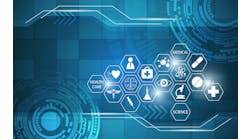Some frontline healthcare workers at the Aurora, Colo.-based University of Colorado Hospital (UCHealth) will be using wearable devices to track their health after receiving the COVID-19 vaccine.
As the 12-hospital UCHealth began administering the Pfizer COVID-19 vaccine to healthcare workers late last week at the University of Colorado Hospital on the University of Colorado Anschutz Medical Campus, some recipients will be wearing the BioIntelliSense BioButton medical device, which health system leaders see “as a foundational step in developing a scalable post-vaccine monitoring program that could be deployed more broadly in high-risk patient populations.”
The BioButton medical grade device and data services are offered by BioIntelliSense, a continuous health monitoring and clinical intelligence company based in Golden, Colo. The coin-sized wearable device aims to delivers continuous vital sign monitoring of temperature, respiratory rate and heart rate at rest. According to the manufacturer’s website, the device is indeed an FDA-cleared medical-grade wearable and is designed to be discreetly worn on the upper left chest “for effortless remote data capture and a simplistic ‘stick it on and forget it’ patient experience.”
UCHealth’s staff and providers will wear the BioButton device for two days prior and seven days following a COVID-19 vaccine dose to detect potential adverse vital sign trends. Together with a daily vaccination health survey and data insights, the wearer may be alerted of signs and symptoms to guide appropriate follow-up actions and further medical management, the health system’s officials explained.
“The participation of our frontline healthcare workers in this vaccine monitoring program serves as an important operational milestone in scaling the program for the larger population, particularly with vulnerable patient populations and seniors in long-term care environments,” said Richard Zane, M.D., UCHealth chief innovation officer and professor and chair of emergency medicine at the University of Colorado School of Medicine. “We work closely with partners like BioIntelliSense to not only navigate the ever-changing landscape of healthcare but collaboratively develop the innovative tools that are transforming the way patients receive care.”
James Mault, M.D., CEO of BioIntelliSense, added that his company is “proud to partner with UCHealth in providing our BioIntelliSense medical-grade wearable technology and advanced data services to address high-risk patient populations and to offer peace of mind monitoring for those who may be concerned about receiving the vaccine.”


